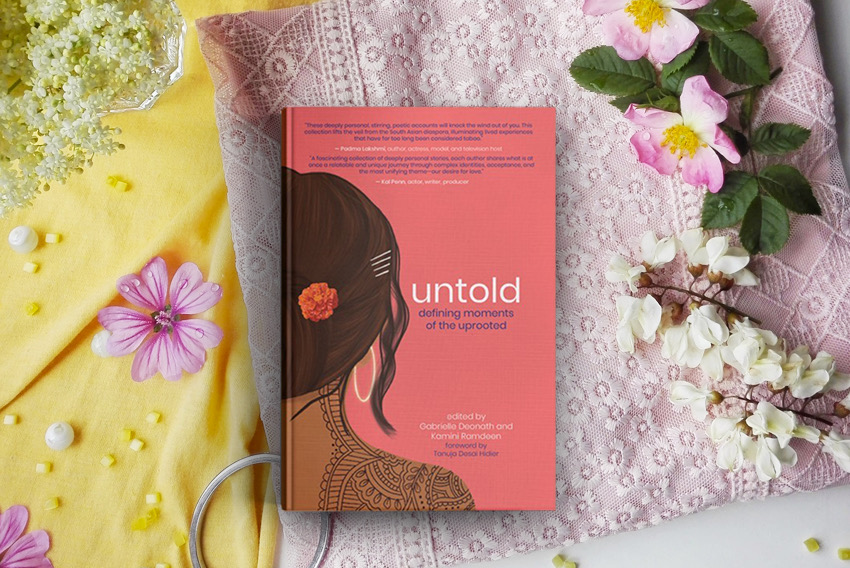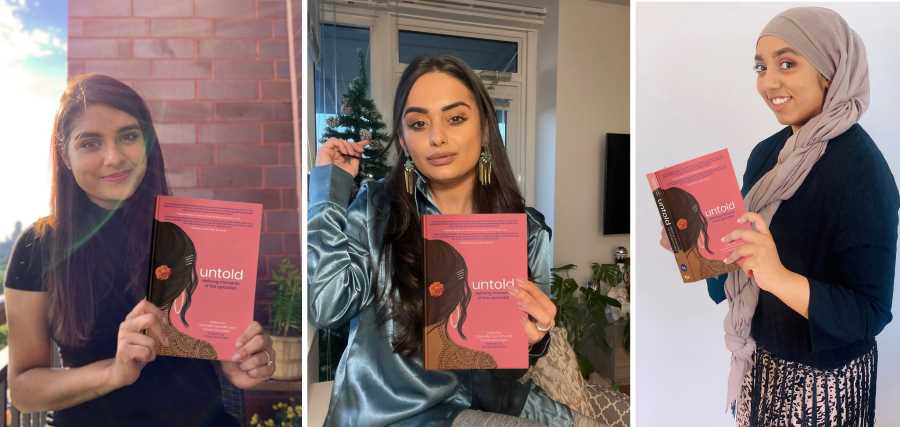Cover photo: L to R: Kamini Ramdeen, Trisha Sakhuja-Walia, and Gabrielle Deonath.
BY VEENA RAO*
Untold: defining moments of the uprooted is a stunning, eye-opening anthology and an important addition to the American literary canon. Written in the creative nonfiction genre by 32 emerging South Asian women writers from around the world and lovingly curated by the Brown Girl Magazine team, each story is an honest, intimate revelation about a transformative moment in the writer’s life.
The pages are filled with the struggles, joys, reflections, and discoveries that make up the South Asian experience. Centering on immigration, abuse, grief, suicide, colorism, coming out, mental health, parenting, in-laws, caste, self-awareness, etc., each story has a deep diasporic sensibility and conveys a unique truth that is not often talked about in mainstream publishing.

In this Q&A, the team behind untold: defining moments of the uprooted Trisha Sakhuja Walia, founder and CEO of Brown Girl Magazine, and editors Gabrielle Deonath and Kamini Ramdeen talk about the story behind the anthology.
Untold deeply probes what it means to be brown and American. How did this anthology come about? What’s the story behind the stories?
Gabrielle Deonath: A few years ago, there was a different anthology project in the works at Brown Girl Magazine, but when the editor in charge of the project left to pursue other opportunities, Trisha was looking for someone to take over.
That’s when I came on board. We tried to salvage the anthology that was already there, but ultimately, we decided that if we were going to put out a new product, it needed to have a clearer direction. That’s when my co-editor Kamini joined the project. As a team, we decided that we wanted to do a different kind of storytelling than what Brown Girl Magazine already provides online, which led us to the idea of creating a print space for South Asian women in the diaspora to share their true, honest personal narratives on a spectrum of topics and experiences. We specifically chose creative nonfiction as the genre because we wanted readers to feel like they were experiencing these stories alongside the authors. These stories are different from personal essays because they include creative elements like dialogue, imagery, and characterization. We also decided that we wanted each story to be focused on an impactful moment or string of related moments in the author’s life.
With these ideas, we put together an open call for pitches and posted it on the Brown Girl website. And then the submissions started pouring in.
The great thing about this anthology is that it’s actually not just focused on the South Asian American experience. While many of our writers do live in the U.S., we also have writers based in Canada, the U.K., and even one who now lives in Denmark. We feel incredibly honored that our call for pitches had such a big reach.
Why does the literary world need to hear our voices?
Trisha Sakhuja-Walia: South Asians living in the diaspora have done everything in their power to carve a space for ourselves. This anthology is a testament that our voices and narratives matter.
Untold is a collection of stories that define a transformative moment in the author’s life. Tell us more about the title and its relevance?
Kamini Ramdeen: The title for “untold” is very intentional and to the point. The stories contained in this anthology are told by authors who live in the diaspora. Many South Asians living or born outside of the motherland have to deal with navigating the intersection between their inherited culture and the culture that they are (many times) learning through trial and error in the US, Canada, UK and elsewhere (hence uprooted). We wanted to be really cognizant of exemplifying the emotion of not feeling like you belong in the title, since so many of us have moments where the culture clash can really make you feel “othered” in a third dimension, not enough of one culture and not enough of the other. And, “defining moments of the uprooted” squarely hits on that theme.
I love that you chose not to italicize South Asian words. What was the reasoning behind this decision?
Kamini Ramdeen: There’s a literary debate about italicizing words that are considered to be foreign. We see that as another way of keeping the diaspora in the “other” box. In reality, these are the words that we speak, hear, and are generally part of our worlds to some degree. And, in a book that is all about diasporic South Asian culture we wanted to shed that entirely. Not italicizing words in Hindi, Urdu, Creole, etc, are intentionally meant to flow with the text. And we present a challenge to readers to look up what these words mean and familiarize themselves with the culture.
What are you hoping to achieve through untold?
Kamini Ramdeen: The book covers a wide range of topics, from LGBTQ+, infertility, suicide, body, colorism, in-laws, divorce, and so much more. With that said, our main hope is that “untold” helps to spark conversations about topics that families, friends, peers, etc. haven’t started organically yet. And hopefully, new safe spaces are opened up as a result of these moments our authors shared from their lives.
How long did it take you to curate the stories? What was the process like,
and what were the challenges? Gabrielle Deonath: When we put out the call for
pitches, we were overwhelmed by the response. This was the first time we were
doing a project like this, so we didn’t know what to expect. We definitely
weren’t expecting to receive over 150 pitches from around the world—but that’s
exactly what happened.
Once all of the pitches were in, it then took Kamini and I about 2-3 work sessions at local coffee shops, over the course of 2 weeks, to read through the pitches and discuss them all. We initially ended up accepting about 65 of those pitches.
Then we asked the writers to turn in a first draft, and through several rounds of edits, we were able to whittle that pool down to the 31 stories we ultimately published. We started reviewing pitches in the beginning of April 2019 and we finalized the manuscript in May 2020, so the entire editorial process of curating and editing the stories took just about a little over a year.
Because this was the first time we were putting together an anthology and working with so many people on this project, there were a number of challenges. We had to be really on top of everything to make sure that nothing slipped through the cracks, so it was helpful that we all divided up the tasks and took on different responsibilities.
For Kamini and I, it was tough balancing this project with our full-time jobs. Last March, when the pandemic hit the U.S., is when we were building the final manuscript in our free time. Lockdown did help to sync our schedules, but we would work our day jobs until 5 in the evening, take an hour break, and then work on “untold” from 6 pm to 3 am most nights. There wasn’t a lot of time for sleeping…or anything else really.
And lastly, editing these stories was different from what Kamini and I had done previously when editing digital content for Brown Girl Magazine. Some of these writers were being published for the first time, and these stories delve into their raw, honest, emotional personal moments that can be heavy to revisit. It required us to shift our approach as editors to be even more understanding, sensitive, and collaborative. Also, many of the writers didn’t know us personally, and we didn’t know them. Being in different areas of the country and the world, we had to try to build their trust in us and provide support through virtual means—like emails, Slack messages, and phone and video calls.
When you embarked on the project, did you have a sense of what the finished product would look like?
Trisha Sakhuja-Walia: Two years ago, it was impossible to envision a book in our hands when we first started because we were unsure if folks would even send us pitches, and once we started receiving pitches, we still couldn’t envision the stories falling into place. From reading the first drafts to connecting with all the authors and doing multiple revisions of every story to finding a publisher and going through the daunting process of figuring out the financials to printing and receiving praise quotes, it’s been a roller coaster. But worth it because holding a copy of our book is the most surreal feeling in the world and I hope we can publish many more.
What are the takeaways from the book? Are there core messages?
Gabrielle Deonath: We hope that what readers take away from “untold” is the feeling of being understood and knowing that they aren’t alone. There are some topics that the South Asian community shies away from openly discussing or certain choices or experiences that are still stigmatized, but that doesn’t mean that there aren’t other people who are going through divorce, dealing with infertility, or struggling to come out to their families, just to name a few examples. We hope that these stories prompt open-minded and open-hearted conversations because I really believe that only by sharing our stories and listening to each other can we really start to heal and find a true sense of community.
Untold: defining moments of the uprooted
Published by Mango and Marigold Press (March 2021)
Edited by Gabrielle Deonath and Kamini Ramdeen
Foreword by Tanuja Desai Hidier
Introduction by Trisha Sakhuja-Walia
Cover by Aishwarya Sukesh
Sub-theme artwork by Simran Sarin
About the Untold… team:
GABRIELLE DEONATH is a Guyanese-American writer, editor, and content creator based in New York. She hopes to give voice to those without a platform and promote authentic representations of minorities and marginalized communities through storytelling. Her writing has appeared in publications including SISTERS Magazine, the Muslim Creative Writers Network anthology Survival of the Hardworking, VirtualMosque.com, and Brown Girl Magazine, where she has also served as an assistant editor for the Indo-Caribbean and political teams.
KAMINI RAMDEEN is a Guyanese-American editor, graphic design artist, photographer, and small business owner based in New York City. She previously managed editorial teams at Brown Girl Magazine, where she led political and Indo-Caribbean coverage. She is the founder of Paulo Grand, a streetwear apparel company that seeks to create awareness and spark conversations about the first-generation American identity and its many intricacies.
TRISHA SAKHUJA-WALIA: With only a few words of English under her belt, Trisha Sakhuja-Walia immigrated with her parents to Queens, New York at the age of five in the early 90s. Displaced from her birth country and struggling to find her place, she’s been on a mission to carve a space for her hyphenated identity. Years later, she would find Brown Girl Magazine while scrolling on Facebook for a journalism class assignment in college, she didn’t know it then but that moment would change her life.
Almost a decade later and a few media jobs under her belt, Trisha went full-time to pursue BrownGirlMagazine.com, where she manages more than 200 contributors, oversees the editorial content, business development, event planning, e-commerce, and marketing. Having spoken at various South Asian-led community events and forums at The Wing, General Assembly, Disney Junior, Columbia University, Michigan State University, and Yale University to name a few, Trisha is continuously striving to amplify the reach of Brown Girl the traditional way — word of mouth. Finally proud of her hyphenated identity, she continues to find unique ways to empower young women living in the diaspora.
Veena Rao is the editor-in-chief of NRI Pulse and the author of Purple Lotus.



